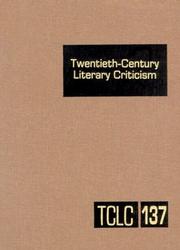Literary criticism reference items
To search for more reference materials on Literary Criticism, simply go to the library catalog >search "Criticism" > Change "Location" to "Reference Dept." and click search.
-
-
 Dictionary of World Literary Terms
by
Call Number: PN41 .S5 1970 RefISBN: 0871160129Publication Date: 1986-07-01
Dictionary of World Literary Terms
by
Call Number: PN41 .S5 1970 RefISBN: 0871160129Publication Date: 1986-07-01 -
-
 Library of literary criticism of English and American authors through the beginning of the twentieth century
by
Call Number: PR83 .M73 1966Publication Date: 1966
Library of literary criticism of English and American authors through the beginning of the twentieth century
by
Call Number: PR83 .M73 1966Publication Date: 1966 -
Nineteenth-Century literature criticism
Call Number: PN761 .N5Volumes 1 -262.
Look for periodically published "Title Index" to find criticism of a particular work.
Each volume has cumulative indices for authors, nationalities, topics, and titles covered since the preceding title index.
Each volume arranged alphabetically by author whose work is critiqued. -
-
 Dictionary of world literature : criticism, forms, technique
by
Call Number: PN41 .S5 RefPublication Date: 1943
Dictionary of world literature : criticism, forms, technique
by
Call Number: PN41 .S5 RefPublication Date: 1943 -
 Epic and Romance Criticism
by
Call Number: Z7156.E6 C64 RefISBN: 0883700018Publication Date: 1973-01-01
Epic and Romance Criticism
by
Call Number: Z7156.E6 C64 RefISBN: 0883700018Publication Date: 1973-01-01 -
 Interpretations, 1890-1977
by
Call Number: Z1231.D7 P3 1979 RefISBN: 0208017135Publication Date: 1979-10-01
Interpretations, 1890-1977
by
Call Number: Z1231.D7 P3 1979 RefISBN: 0208017135Publication Date: 1979-10-01 -
 English Prose and Criticism in the Nineteenth Century
by
Call Number: Z2014.P795 W54 RefISBN: 0810312352Publication Date: 1979-05-01
English Prose and Criticism in the Nineteenth Century
by
Call Number: Z2014.P795 W54 RefISBN: 0810312352Publication Date: 1979-05-01 -
-
 The American novel : a checklist of twentieth-century criticism
by
Call Number: Z1231.F4 G4 RefPublication Date: 1970
The American novel : a checklist of twentieth-century criticism
by
Call Number: Z1231.F4 G4 RefPublication Date: 1970
Deconstruction
-
-
 The Contest of Faculties
by
Call Number: PN98.D43 N58 1985ISBN: 0416399304Publication Date: 1985-12-01
The Contest of Faculties
by
Call Number: PN98.D43 N58 1985ISBN: 0416399304Publication Date: 1985-12-01
Environmental theory/criticism
-
An Ecological and Postcolonial Study of Literature by
Call Number: PR830.I593 M37 2007ISBN: 9781403976406Publication Date: 2007-03-15 -
The Geographical Imagination of Annie Proulx by
Call Number: PS3566.R697 Z67 2009ISBN: 9780739123942Publication Date: 2008-12-16
Feminist Criticism
-
 A Dialogue of Voices
by
Call Number: PN98.W64 D49 1994ISBN: 9780816622955Publication Date: 1994-01-01
A Dialogue of Voices
by
Call Number: PN98.W64 D49 1994ISBN: 9780816622955Publication Date: 1994-01-01 -
Marxism
-
The Marxian Imagination by
Call Number: PR830.S6 M37 2003ISBN: 1583670971Publication Date: 2003-09-01 -
Marxism and Literary Criticism by
Call Number: (eBook)ISBN: 0203361776Publication Date: 2002-08-09 -
Marxism and the Interpretation of Culture by
Call Number: HX523 .M3766 1988ISBN: 9780252014017Publication Date: 1987-10-01
Modernity/Postmodernism
-
-
 The Death of Literature
by
Call Number: PN98.P67 K47 1990ISBN: 0300047835Publication Date: 1990-09-26
The Death of Literature
by
Call Number: PN98.P67 K47 1990ISBN: 0300047835Publication Date: 1990-09-26 -
-
Psychoanalysis
Structuralism
-
 Structuralism and the Logic of Dissent
by
Call Number: PN98.S7 T37 1989ISBN: 0252060458Publication Date: 1989-01-01
Structuralism and the Logic of Dissent
by
Call Number: PN98.S7 T37 1989ISBN: 0252060458Publication Date: 1989-01-01 -
Structuralism and Semiotics by
Call Number: P146 .H3 1977cISBN: 0520034228Publication Date: 1977-09-12
How subject headings work
If you do a Subject Search for "Criticism," you will notice narrower terms appear. You can click these to narrow your search:
- American newspapers--Sections, columns, etc.--Reviews
- Architectural criticism.
- Art criticism
- Bible--Criticism, interpretation, etc.
- Book reviewing
- Books--Reviews.
- Canon (Literature)
- Critics
- Deconstruction
- Drama--History and criticism.
- Dramatic criticism
- Ecocriticism.
- Feminist criticism.
- Film criticism
- Formalism (Literary analysis)
- Hermeneutics.
- Historical criticism (Literature)
- Intertextuality.
- Literature--History and criticism.
- Marxist criticism.
- Mass media criticism.
- Music--History and criticism.
- Newspapers--Sections, columns, etc.--Reviews
- Photographic criticism
- Poetry--History and criticism.
- Reader-response criticism.
- Rhetorical criticism
- Structuralism (Literary analysis)
- Television criticism
Literature by Country
The subject term “English” means “British.” So, "English literature" means the literature of England (Britain), not literature written in English. Compare this to "American Literature," "Irish literature," "Scottish Literature," "French literature," etc. Follow this pattern for other specifc literary genres, i.e., fiction, poetry, short stories.
Examples
- English poetry.
- War poetry, English.
- Short stories, Irish.
History and criticism
The subdivision “History and criticism” means that the book offers literary criticism, history, and analysis on thattopic. When you are browsing subject headings, look for your lead term subdivided by "History and criticism" for the broadest selection of criticism on your topic.
Examples
- Literature, Modern--20th century--History and criticism.
- Lesbians' writings, American--History and criticism.
Criticism and interpretation
The subdivision "Criticism and interpretation" means that the book offers criticism and analysis of an author's works or endeavors, without a primary focus on biographical details.
Example
- Dickinson, Emily, 1830-1886--Criticism and interpretation.
Critical analysis
Critical analysis can also be offered under the author's name as subject without any subdivisions, but usually the unsubdivided author heading contains works more biographical or general in nature. Compare the results of the --Criticism and interpreation heading above to the following:
Dickinson, Emily, 1830-1886.
Biography
If the work is primarily a biography, an additional heading will tell you so. The subject will be the class of persons to which the author belongs, subdivided by --Biography. For example, Emily Dickinson's most specific class is "Poets, American--19th Century":
Poets, American--19th century--Biography.
Other Topics
If the work has other topics, the name heading will be paired with a topical heading, such as:
- Women and literature--United States--History--19th century.
- Daughters in literature.

